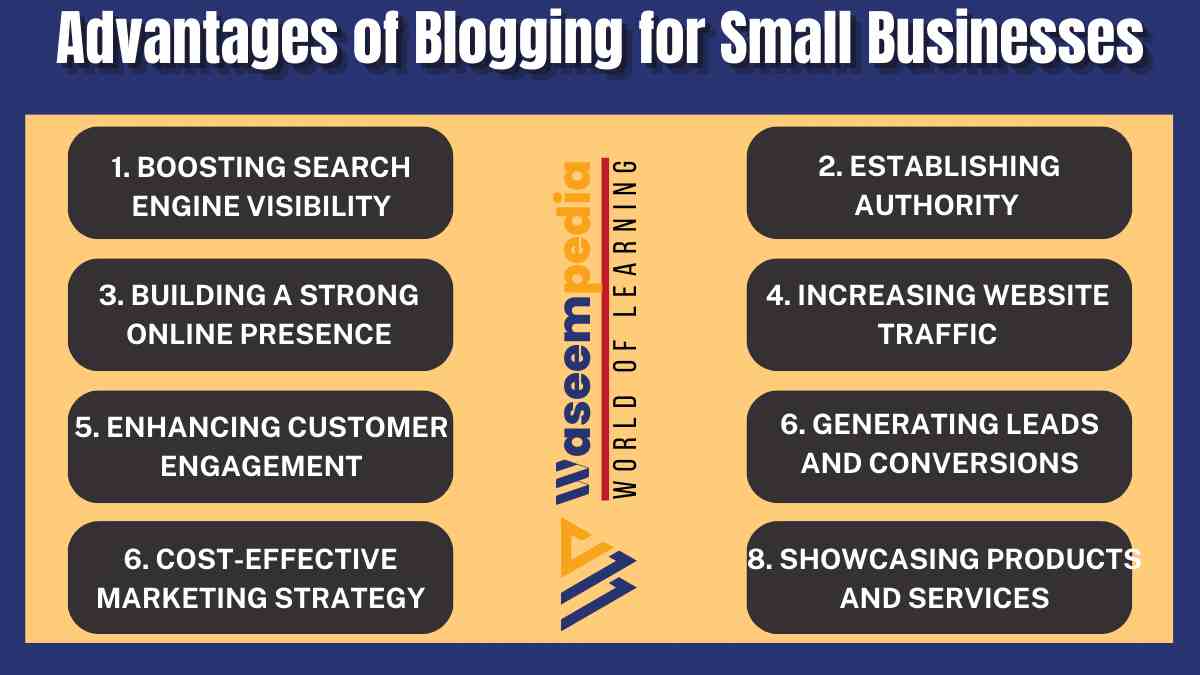Blogging having many advantages for small businesses like improved search engine visibility, increased website traffic, enhanced customer engagement, and cost-effective marketing. By utilizing blogs effectively, small businesses can establish their brand, connect with their audience, and gain a competitive edge in the digital landscape.In this article, we will read the numerous advantages that blogging offers to small businesses.
In today’s digital age, blogging has emerged as a powerful tool for small businesses to reach their target audience, establish their brand, and boost their online presence. With the advent of user-friendly blogging platforms and the increasing popularity of content marketing, businesses are leveraging blogs to share valuable information, engage with their customers, and drive traffic to their websites.

In today’s competitive business landscape, having a strong online presence is crucial for the success of small businesses. Blogging provides an excellent platform for businesses to showcase their expertise, connect with their target audience, and share valuable insights. Let’s delve into the advantages of blogging for small businesses.
13 Advantages of Blogging for Small Businesses
There are 13 Advantages of Blogging for Small Businesses are as following.
1. Boosting Search Engine Visibility
One of the primary advantages of blogging is its ability to improve a small business’s visibility on search engines. By consistently publishing high-quality, keyword-rich content, businesses can optimize their blog posts for search engine algorithms. This optimization leads to better search engine rankings, increased organic traffic, and improved brand visibility.
2. Establishing Authority and Credibility
Blogging allows small businesses to establish themselves as industry experts and thought leaders. By sharing informative and insightful content, businesses can showcase their knowledge and expertise in their respective fields. This helps in building trust with the audience and positioning the business as a credible source of information.
3. Building a Strong Online Presence
Blogs act as a virtual storefront for small businesses, providing them with a platform to showcase their brand, products, and services. A well-designed blog with engaging content helps businesses create a strong online presence, making it easier for potential customers to find and connect with them.
4. Increasing Website Traffic
Blogging plays a vital role in driving traffic to a small business’s website. When businesses publish blog posts regularly, they provide fresh and valuable content that attracts visitors. By incorporating relevant internal links within the blog posts, businesses can guide readers to other pages on their website, increasing overall website traffic.
5. Enhancing Customer Engagement
Engaging with customers is essential for building lasting relationships and driving customer loyalty. Blogs offer an interactive platform where businesses can connect with their audience, respond to comments, and encourage discussions. This level of engagement fosters a sense of community and encourages customers to become brand advocates.
6. Generating Leads and Conversions
Blogging serves as an effective lead generation tool for small businesses. By including compelling calls-to-action within blog posts, businesses can capture visitor information and convert them into leads. Additionally, businesses can use blog posts to highlight their products or services and encourage readers to make a purchase or take a specific action.
7. Cost-Effective Marketing Strategy
Compared to traditional marketing channels, blogging provides small businesses with a cost-effective marketing strategy. With minimal investment, businesses can create and maintain a blog that serves as a long-term marketing asset. Blogging helps businesses reach a wider audience and achieve marketing goals without incurring substantial expenses.
8. Creating Opportunities for Networking
Through blogging, small businesses can connect and collaborate with other industry professionals, influencers, and potential partners. By sharing valuable insights and engaging in conversations within the blogging community, businesses can expand their network, gain exposure, and open doors to new opportunities.
9. Showcasing Products and Services
Blogs offer a platform for small businesses to showcase their products and services in a more detailed and informative manner. By writing product reviews, case studies, or how-to guides, businesses can effectively highlight the features and benefits of their offerings, thereby influencing potential customers’ purchasing decisions.
10. Building a Community
Blogging enables small businesses to build a community around their brand. By consistently providing valuable content, responding to comments, and fostering discussions, businesses can create a loyal following of customers and brand advocates. This sense of community not only strengthens the bond with existing customers but also attracts new ones.
11. Keeping Customers Informed
Blogs serve as an excellent channel for keeping customers informed about the latest updates, news, and developments in the industry. By sharing industry insights, trends, and upcoming events, businesses can position themselves as a go-to resource for customers seeking relevant information.
12. Monitoring Customer Feedback
Blogs allow businesses to receive direct feedback from their customers. By encouraging comments and actively engaging in discussions, businesses gain valuable insights into customer preferences, needs, and pain points. This feedback can be used to refine products, improve services, and enhance the overall customer experience.
13. Improving Social Media Presence
Blogging and social media go hand in hand. By sharing blog posts on social media platforms, businesses can drive traffic to their blogs and increase their social media reach. Engaging blog content also provides valuable material for businesses to share on their social media channels, attracting more followers and expanding their online presence.
Related FAQ’s
Do small businesses need a blog?
Yes, small businesses can benefit from having a blog to improve online visibility, engage with customers, and establish authority in their industry.
What is the biggest advantage of business blogs?
The biggest advantage of business blogs is the ability to establish and showcase expertise, which builds trust with potential customers and helps generate leads and sales.
What is the advantage of blogs marketing?
The advantage of blog marketing is its ability to attract and engage a target audience, drive website traffic, and ultimately convert readers into customers or clients.
What is a blog and how it is useful for a business?
A blog is a regularly updated online platform where individuals or businesses can publish content on various topics. It is useful for a business as it helps improve online visibility, engage with customers, establish authority in the industry, and drive traffic and leads to the business website.
How can blogs drive small business leads?
Blogs can drive small business leads by attracting organic website traffic through valuable content, capturing leads with call-to-action buttons and forms, and nurturing those leads with relevant information, ultimately converting them into customers or clients.

